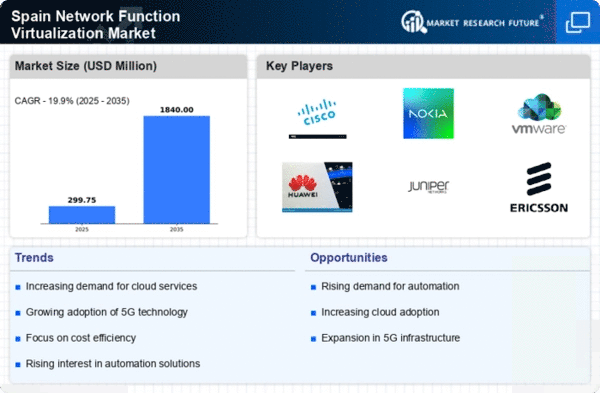Emergence of 5G Technology
The advent of 5G technology is poised to significantly impact the network function-virtualization market in Spain. With its promise of ultra-fast data speeds and low latency, 5G is expected to drive the demand for more sophisticated network solutions. Virtualization plays a crucial role in enabling the deployment of 5G networks, as it allows for the efficient management of network resources and services. Spanish telecom operators are increasingly investing in virtualization technologies to support their 5G rollouts, which could lead to a projected market growth of 25% in the coming years. As 5G becomes more prevalent, the network function-virtualization market is likely to expand in tandem, driven by the need for advanced infrastructure.
Rising Demand for Cost Efficiency
The network function-virtualization market in Spain is experiencing a notable surge in demand for cost efficiency among enterprises. Organizations are increasingly seeking to reduce operational expenses while maintaining high service quality. By adopting network function virtualization, companies can significantly lower their capital expenditures, as they no longer need to invest heavily in physical hardware. This shift is evidenced by a reported 30% reduction in infrastructure costs for businesses that have transitioned to virtualized networks. Furthermore, the flexibility offered by virtualization allows for better resource allocation, which is crucial in a competitive market. As Spanish companies strive to optimize their budgets, the network function-virtualization market is likely to see continued growth driven by this imperative for cost efficiency.
Government Initiatives and Support
In Spain, government initiatives aimed at promoting digital transformation are playing a pivotal role in the growth of the network function-virtualization market. The Spanish government has launched various programs to encourage the adoption of advanced technologies, including network virtualization. These initiatives often include financial incentives, grants, and support for research and development. For instance, the government has allocated €500 million to support digitalization efforts across various sectors, which indirectly boosts the network function-virtualization market. This proactive stance not only fosters innovation but also enhances the overall competitiveness of Spanish enterprises, making them more inclined to invest in virtualization solutions.
Increased Focus on Network Agility
The need for enhanced network agility is becoming increasingly apparent in the network function-virtualization market in Spain. As businesses face rapidly changing market conditions, the ability to quickly adapt network resources is essential. Virtualization allows for dynamic resource allocation, enabling organizations to respond to fluctuations in demand with greater ease. This agility is particularly crucial for sectors such as telecommunications and finance, where service delivery speed can significantly impact customer satisfaction. Reports indicate that companies utilizing network function virtualization have improved their service deployment times by up to 40%. Consequently, the drive for network agility is likely to propel further investments in virtualization technologies across Spain.
Growing Importance of Data Privacy Regulations
The network function-virtualization market in Spain is also influenced by the increasing importance of data privacy regulations. With the implementation of stringent data protection laws, such as the General Data Protection Regulation (GDPR), organizations are compelled to adopt solutions that ensure compliance. Network function virtualization offers enhanced security features that can help businesses manage and protect sensitive data more effectively. As companies strive to meet regulatory requirements, the demand for virtualization solutions that prioritize data privacy is expected to rise. This trend is likely to create new opportunities within the network function-virtualization market, as firms seek to align their operations with legal standards while maintaining efficiency.
















